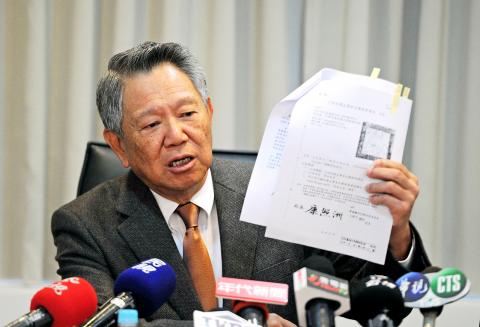The National Health Research Institutes (NHRI), a nonprofit foundation established by the government, yesterday said it could produce 200,000 doses of a vaccine against the new H7N9 strain of avian flu within three months in the event of an emergency.
“The NHRI could support Department of Health policies to fight disease by producing vaccines if there were an emergency,” Su Ih-jen (蘇益仁), director of the NHRI’s National Institute of Infectious Diseases and Vaccinology, said at a meeting called by the Taiwan Solidarity Union (TSU) at which the department gave a briefing on H7N9 bird flu vaccines.
The health department reported it has sent out requests to the US Centers for Disease Control and Prevention (CDC), the WHO and China for the vaccine strain or the virus strain, and have so far secured the US CDC’s preliminary consent to access its H7N9 virus strain.

Photo: CNA
The department said it takes approximately two months to prepare a vaccine from the H7N9 virus strain, another six months for mass production of the vaccine by domestic vaccine manufacturers, and time would also be needed before the final market authorization could be granted by the health authorities.
Deputy Department of Health Minster Lin Tzou-yien (林奏延) said the first batch of H7N9 vaccine produced, expected to be 300,000 or 500,000 doses, would be provided to disease-control workers, frontline healthcare workers and poultry farmers.
“We would be able to use reverse genetics technology to prepare a vaccine seed strain [from the H7N9 virus strain] if necessary, even though this would be our very first,” Lin said.
Su confirmed the institute’s ability, but added that there is still the question of which of the H7N9 virus strains would be offered.
“There are differences in the strains discovered in the four H7N9-affected regions in China, and we hope China can provide more information on the adaption of the virus strains. A vaccine based on the earliest-discovered virus strain would likely prove to be the most effective,” he said.
TSU lawmakers at the meeting reiterated their skepticism about cross-strait cooperation on the vaccine production.
“Undertaking a vaccine production project hand-in-hand with a country aiming more than a thousand missiles at Taiwan would be ludicrous,” TSU caucus whip Lin Shih-chia (林世嘉) said.
“It’s possible that the reason China has delayed providing the virus strain is out of commercial or political concern, for fear that we might successfully develop the vaccine ahead of them,” TSU Legislator Hsu Chung-hsin (許忠信) said.
Discussing Taiwan’s situation of being denied access to vaccines and other benefits promised by the Pandemic Influenza Preparedness Framework for WHO member states, Lin urged the government to continue its efforts to join the organization instead of being content with observer status at the World Health Assembly.
Additional reporting by CNA

Taiwan is stepping up plans to create self-sufficient supply chains for combat drones and increase foreign orders from the US to counter China’s numerical superiority, a defense official said on Saturday. Commenting on condition of anonymity, the official said the nation’s armed forces are in agreement with US Admiral Samuel Paparo’s assessment that Taiwan’s military must be prepared to turn the nation’s waters into a “hellscape” for the Chinese People’s Liberation Army (PLA). Paparo, the commander of the US Indo-Pacific Command, reiterated the concept during a Congressional hearing in Washington on Wednesday. He first coined the term in a security conference last

Prosecutors today declined to say who was questioned regarding alleged forgery on petitions to recall Democratic Progressive Party (DPP) legislators, after Chinese-language media earlier reported that members of the Chinese Nationalist Party (KMT) Youth League were brought in for questioning. The Ministry of Justice Investigation Bureau confirmed that two people had been questioned, but did not disclose any further information about the ongoing investigation. KMT Youth League members Lee Hsiao-liang (李孝亮) and Liu Szu-yin (劉思吟) — who are leading the effort to recall DPP caucus chief executive Rosalia Wu (吳思瑤) and Legislator Wu Pei-yi (吳沛憶) — both posted on Facebook saying: “I

Sung Chien-liang (宋建樑), who led efforts to recall Democratic Progressive Party (DPP) Legislator Lee Kun-cheng (李坤城), was released on bail of NT$80,000 today amid outcry over his decision to wear a Nazi armband to questioning the night before. Sung arrived at the New Taipei District Prosecutors’ Office for questioning in a recall petition forgery case last night wearing a red armband bearing a swastika, carrying a copy of Adolf Hitler’s Mein Kampf and giving a Nazi salute. Sung left the building at 1:15am without the armband and covering the book with his coat. Lee said today that this is a serious

The Ministry of Economic Affairs has fined Taobao NT$1.2 million (US$36,912) for advertisements that exceed its approved business scope, requiring the Chinese e-commerce platform to make corrections in the first half of this year or its license may be revoked. Lawmakers have called for stricter enforcement of Chinese e-commerce platforms and measures to prevent China from laundering its goods through Taiwan in response to US President Donald Trump’s heavy tariffs on China. The Legislative Yuan’s Finance Committee met today to discuss policies to prevent China from dumping goods in Taiwan, inviting government agencies to report. Democratic Progressive Party Legislator Kuo Kuo-wen (郭國文) said